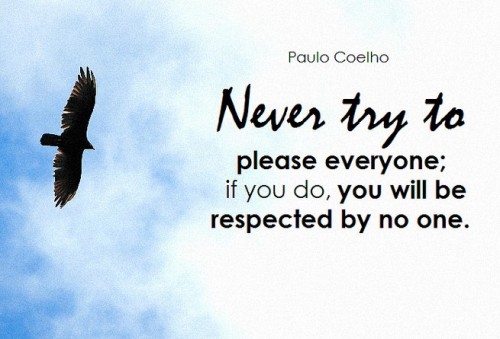7 Ways to Have a Stronger Sense of Self
Why do you need a strong sense of self?

By: Derrick Tyson
Life is often challenging and full of surprises. Without a strong sense of self it’s easy to become overwhelmed. Imagine that your life is a sea and you are swimming along. All fine, if the sun is out and the water is smooth. Then say the wind picks up and the water gets choppy. A strong sense of self is like a moored raft you can grab onto until the storm passes and you feel ready to swim again. Without it, you are left floundering along in a state of panic. It’s not that you are having an identity crisis per se – it’s just that you feel you are always going and going but getting nowhere except exhausted. Sound familiar?
Without a solid self identity, it’s hard to have healthy relationships. Inconsistency of behavior makes it hard for others to understand you. And if you lack a sense of who you are it’s likely you struggle with trust. Your fear would be that if you let people close they will realize you are a mess and reject you.
It’s also very hard to develop a sense of worth if you have no sense of self. Esteem is connected to believing that who you are deserves respect and love. But you can’t believe that if you don’t really know who we are.
In other words, without a strong sense of self and a clear identity, you are prone to lack of self-esteem, depression, and a fear of intimacy that leaves you constantly feeling lonely.
7 Ways to Have a Stronger Sense of Self
1) Find your values.
Values are the deep-rooted beliefs you have that guide your every choice in life, whether you are aware of them or not. The trouble comes if you think you know your values, but are actually using your conscious mind to cherry pick the values you think you should have, because your friends and colleagues have them. Using another person’s values just leaves you constantly working against yourself. Your true values will be things you took on board very early in life, or that are quite possibly linked to DNA (although the verdict is still out on the nature vs nurture battle).
 It pays to look at your actions over your thoughts to find your true values. If you think one of your true values is money, but you tend to always take a job that pays less than you are worth and prefer to spend your free time volunteering then doing your accounts? It might just be you are kidding yourself. Your value might be instead helping others.
It pays to look at your actions over your thoughts to find your true values. If you think one of your true values is money, but you tend to always take a job that pays less than you are worth and prefer to spend your free time volunteering then doing your accounts? It might just be you are kidding yourself. Your value might be instead helping others.
Values not only give us a clearer sense of self, they offer us energy, focus, and self-confidence. Going against our values is one thing – exhausting! It’s much harder to pretend to be something then to be what you actually are, and living a life in line with our values is the trick to having the sort of life where you want to jump out of bed in the morning.
2) Practise saying no.
Every time we say yes to something we don’t really want we weaken our sense of self. It’s like constantly lying to yourself until in the end you don’t even know what the truth is.
For example, if you don’t like playing tennis, but your friend asks you to join the tennis club when you really want to join the running club but you say yes, what can happen? Well, you might find tennis okay. Soon you’ll convince yourself that having an okay time is good enough. Next you might even decide you like tennis after all, entirely forgetting the absolute high you get out of going running. And you might then not bother to go running at all anymore, letting your joy go down a notch as you settle for ‘good enough’.
If you say yes to things you don’t want enough times, you can become so far removed from knowing what makes you happy you have no sense of self and feel a low grade depression.
So how do you say no? Keep it simple. Don’t give a reason for your decision, it just gives the person you are saying no to room to negotiate and get their way and makes you look indecisive. Keep your refusal upbeat and firm. If you say no with a positive energy the other person will be more likely to accept you mean it then if you give a sad face and say hesitantly ‘no, I guess I shouldn’t…” And note that you don’t have to be impolite. Just a firm ‘no, that’s not for me, but thank you’ usually does the trick.
3) Become very aware of your need to please.
Does the above point of ‘just saying no’ have you shaking in your boots? It’s likely you are a pleaser.
 It is very hard to have a strong sense of self if we form our identity based on the opinions the others, and choose our actions based on their responses to us. The thing to keep in mind is that it is simply not possible to please everyone. We have to pick and choose who we make happy, and the person who deserves to be at the top of the list is you.
It is very hard to have a strong sense of self if we form our identity based on the opinions the others, and choose our actions based on their responses to us. The thing to keep in mind is that it is simply not possible to please everyone. We have to pick and choose who we make happy, and the person who deserves to be at the top of the list is you.
If pleasing yourself instead of others makes you uncomfortable, think of it this way – if you are happy, people will be pleased just to be around you. But if you are miserable from your attempts to impress others then you won’t really please anyone. By pleasing yourself instead of others, you end up naturally a more pleasing person!
Of course if you are a pleaser, it can be very difficult to break the pattern. Start by asking yourself, with every decision you make, am I doing this for myself, or for the other person? And take time to sit down and write about this question- “what would my life look like if I didn’t have to please anyone?”
Also, learn about codependency, which is where we find our self worth through others approval. Start by reading our guide to codependency.
4) Work towards accepting yourself.
If you are in a constant state of self-judgement it’s like trying to see yourself clearly through a rain of fired arrows- you aren’t letting yourself just be long enough to see yourself, let alone feel strong and confident. How can you, when you are focusing on the negative? Of course being told to accept yourself is all well and good, but if you do feel down on yourself already it can be that sort of advice you feel worse for hearing.
The secret is to not focus too long on the idea of acceptance, but to as quickly as possible focus on real actions that lead you in that direction. Make a list of all the things that are going alright in your life, and all the things you like about yourself no matter how small, and read through it at least once a day. Spend more time doing things you are naturally good at, and less attempting things that make you feel a failure. Get honest with yourself, too, about social situations you are choosing that make you feel less then good enough. If you have critical friends, is it time to find a new social circle?
Part of self-acceptance is to start to catch your cycle of negative thoughts that tell you you aren’t good enough. The next point, mindfulness, which can do wonders on this front, by helping you be aware of your thoughts in the first place.
5) Get mindful.
Sometimes all it takes to have a stronger sense of self is to slow down enough that you can actually hear yourself clearly and truly sense how you are really feeling about things. This helps avoid that ‘speak before you think’ trap where later you are frustrated to realise you didn’t say how you really felt or ask for what you really wanted at all, which inevitably leaves you feeling weak and a pushover.
Mindfulness is a practical tool gaining popularity with therapists that helps you learn to be more in the present moment. It involves learning how to more aware of what is around you in the present, as well as how you are truly feeling. Try our two-minute mindfulness break to experience the benefits for yourself.
6) Learn how to be alone.
 Granted, the way you respond and react to others is a great way to learn about yourself. But if you never spend much time by yourself, how can you truly know what your real self is?
Granted, the way you respond and react to others is a great way to learn about yourself. But if you never spend much time by yourself, how can you truly know what your real self is?
The truth is that many of us subconsciously fear being alone. We know that all the things we are avoiding dealing with tend to surface when we give ourselves time to think. With our modern busy lives its easier than ever for many of us to avoid being alone. We rush form our work day surrounded by colleagues, to our home life surrounded by family.
Spending time alone doesn’t mean you need to book out a week to go to a mediation retreat or do anything radical (although a week alone is a truly enlightening experience if you are the sort always surrounded by others). It can just mean carving out one evening a week to do something for yourself, by yourself. Choose something that you really love, whether that is a long walk or going to see a foreign film, or spending time at home writing in your journal.
It is true that learning to be alone if you aren’t used to it can at first feel a bit miserable. Emotions you have hidden from yourself might surface, and you might, for the first time in a long time, actually feel a little lonely. But wait it out. Once you adjust to spending time alone you’ll also start to hear yourself clearly. It can be quite exciting to suddenly have a clearer voice in your head telling you what you do and don’t like.
7) Find yourself with therapy.
At the end of the day, the mind can be a tricky beast leading us astray into negative self beliefs no matter how hard we try. Sometimes the best thing of all when we are trying to build a stronger sense of self is impartial help from someone who first, has no demands of us, and second, is on our side. And that’s what a therapist is for.
All kinds of therapy can do wonders for clarifying our sense of self and building up our esteem. Talk therapies like psychodynamic psychotherapy and people centered counselling are good options. CBT is another choice, focusing on catching our cycles of negative thoughts which then changes the actions we take and the way we feel.
Conclusion
With the media constantly slamming us with notions of who we should and shouldn’t be, and a world of social media where even those with the strongest self-esteem can fall prey to wanting to be liked by others so pleasing instead of being authentic, it’s harder then ever to stay true to ourselves. But take time to be with yourself and be yourself, and you’ll soon have a stronger sense of self that sees you making choices that constantly lead you closer to the life that makes you content.





A helpful article but personally i find knowing what the above problems are is not enough to change them .I did see a therapist who said it was inadvisable to analyse, as he put it, my oedipal wound(i am 60) as i could go mad! charming.
I am teriffically hard on myself (something i am slowly and painfully becoming aware of.But how to change? I live through others opinions of me.The analyst(NHS) told me my development was stymied,great.Every thing i told him he wrote up and put it on my medical records.I play guitar but i dont perform but i want to i have for 30 years sad eh.I stopped drinking .I am alone.I am hyper aware to peoples dis-approval.Ho hum i carry on.
It sounds like you didn’t feel comfortable or supported by your therapist. Finding the right therapist can be like dating, you have to try a few first, and also find the right kind of therapy for you. If you are a highly emotional, very oversensitive and sometimes reactive person, and go to traditional analysis (psychoanalytical psychotherapy) it could be the wrong match entirely. Schema therapy might be something to consider, or people centred counselling (also called humanistic counselling). Both these forms of counselling are about creating a warm, trusting relationship where the therapist works to see and support your greatness. Of course if you find yourself going to just a lot of first appointments and writing off all therapists as ‘not good enough’, you might have trust issues. So try to give the next one who seems vaguely ok four appointments before deciding.
Thank you for reminding us that how we take our own self for granted and how we must accept and respect who we naturally are.
How we were treated by our caregivers in our formative years matters a lot. As does genetic predisposition.
Yes, it’s often a mix of biology, environment, and experience.
hi who is your support system also what do you loose time doing what do you want to do without anyone’s approval. Get anchored in your own approval talk to yourself out loud about what your strengths are Do you have a family If they criticize you get away from them Do good things for others like when you are shopping. or in public don’t let others opinions dictate who you are there’s only one you and noone knows you like you
be yourself everyone else is taken
Thanks for the share Sandy!